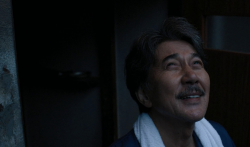The Georgetown University Theater and Performance Studies Program’s latest production, the D.C. premiere of Timberlake Wertenbaker’s The Grace of Mary Traverse, is not for the faint of heart. Set in turbulent late 18th-century London, the play follows a young Mary Traverse as she seeks identity, power, and experience, while constantly struggling with the complexities of the world and her own place within it. Her inexorable quest for liberation and knowledge is the force for the play’s drama. As she moves beyond her origins as a privileged and sheltered daughter of a wealthy merchant to an idealistic rabble-rouser, the play morphs from a stilted comedy of manners to a Faustian human drama.
Much of the play’s humor comes in the first act, and almost all of it is based around double entendres or puns. Mary is exposed to the wonders and dangers of the outside world by a Ms. Temptwell, introduced to the realm of sexual pleasure by a Mr. Hardlong, bombarded by ill-conceived come-ons from an old Mr. Exrake. And so on. Though written in 1985, Wertenbaker’s laughs come from the same comedic vein as Much Ado About Nothing—slightly silly, partly sexual, and unmistakably British.
As Mary continues her descent from the highest crust of society to the streets’ lowest depths, the play takes a darker turn. The second act is a fascinating study of the title character—intensely ambitious and self-absorbed, we watch her struggle to come to terms with the sometimes brutal realities she so relentlessly seeks out. When everything she planned turns out hopelessly, terribly wrong, she’s forced to wonder if she herself is evil, or if she is simply the product of the harsh and unforgiving world she discovers around her. “I don’t understand the world yet, but I will, I will,” she vows.
The minimalistic set relies heavily on lighting changes and the Gonda Theatre’s moveable stage pieces, but the actors do a great job retaining the feel of colonial-era Britain. Nikki Massoud’s (COL ‘11) Mary is fantastic, showing all the earnest curiosity and selfish, brooding restlessness that makes her character compelling. Danny Rivera (COL ‘11) plays a hilariously conflicted lord whose bid for historical greatness falls hopelessly short, and Jimmy Dailey (COL ‘11) provides a pompously refined Mr. Manners, whose steely demeanor and wit lend a steadying hand to the play’s rollicking drama. The only thing out of place is the scene transition music, which ranges from eerie ambiance to downbeat trip-hop, damaging the cohesiveness of the experience.
It’s hard to believe that this play has never been performed in the District—questioning populism, democracy, and the conservative order, its human drama is backlit by a serious political and historical inquiry. Wertenbaker, a visiting professor at Georgetown from 2005 to 2006, will be on hand for the play’s opening on April 8th to participate in a question-and-answer session, and will be visiting classes throughout April. Her close collaboration with Director Maya Roth is evident in the way the play’s climax manages to mix its examination of a kind of messy, violent populist precursor to democracy with the twisted interactions of its characters. Though it will test audiences’ patience as it drags a bit, its resolution is satisfying. A period piece with modern day implications? The Ghost of Mary Traverse is much ado about something—something British, something humorous, and wholly worth seeing.





